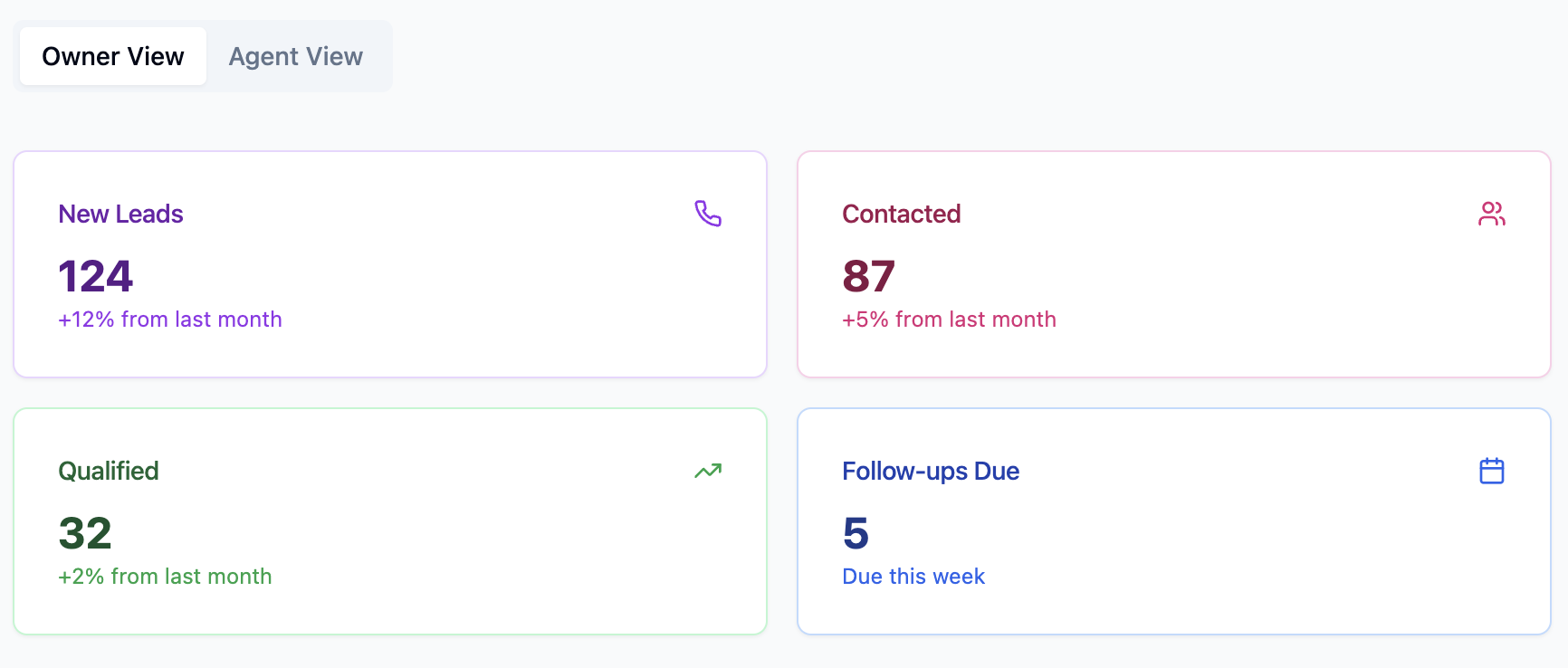What is a CRM in Real Estate? The Ultimate Tool for Agent Success Explained
If you’re a real estate professional, you’ve almost certainly heard the term “CRM” frequently mentioned as a must-have technology. But what exactly is a CRM in real estate? How does it differ from a general business CRM, and why is it considered so indispensable for agents, teams, and brokerages aiming to thrive in today’s competitive market? Understanding this foundational concept is the first step to leveraging its power to transform your business.
A real estate CRM is far more than just a digital address book; it’s a comprehensive system designed to help you manage every aspect of your client relationships and sales processes. This guide will clearly define what a real estate CRM is, break down its core functionalities, highlight its benefits, and explore how advanced AI-powered platforms like Glue Sky are taking these capabilities to a new, revolutionary level.
Defining “CRM”: The Basics of Customer Relationship Management
First, let’s understand the acronym. CRM stands for Customer Relationship Management. In a broad sense, it refers to all the strategies, practices, and technologies that companies use to manage and analyze customer interactions and data throughout the entire customer lifecycle. The primary objectives of any CRM approach are to:
- Improve business relationships with customers and prospects.
- Streamline processes related to sales, marketing, and customer service.
- Enhance customer loyalty and retention.
- Ultimately, drive business growth and profitability.
While this is a universal business concept, its application and the specific tools used can vary significantly by industry.

At its heart, a real estate CRM is about managing and nurturing relationships with buyers and sellers.
So, What is a CRM Specifically for Real Estate?
A CRM in real estate is a specialized Customer Relationship Management system tailored to the unique needs, workflows, and data requirements of real estate professionals. It’s a software platform that helps agents, teams, and brokerages efficiently manage interactions with leads, prospects, current clients, past clients, and even referral partners, all while keeping track of property details and transaction progress.
The real estate CRM explained simply: it’s your central command center for all client-facing activities and sales processes. It helps you organize your contacts, follow up consistently, manage your deals, automate marketing efforts, and gain insights into your business performance, all within a framework designed for the property market. For a deeper dive into the term itself, see our post on CRM definition real estate.
Key distinctions of a real estate CRM compared to a generic one include features for managing:
- Property-specific information (listings, features, client preferences).
- Complex, multi-stage transaction pipelines.
- Long-term lead nurturing essential for lengthy real estate sales cycles.
- Referral tracking and management.
- Integration with real estate-specific tools (MLS, IDX, showing services).
Core Functions: What Does a Real Estate CRM Actually Do?
To fully grasp what a real estate CRM is, let’s look at its typical core functions and the CRM tools it provides:
1. Contact and Lead Management
This is the foundation. It’s about more than just storing names and numbers.
- Centralized Database: A secure place to store all information about leads, clients, past clients, and sphere of influence (SOI). Your CRM database is crucial.
- Detailed Profiles: Track contact details, lead source, property interests (beds, baths, location, price range), communication history, important dates, and personal notes.
- Lead Segmentation: Group contacts (e.g., “hot buyer leads,” “seller prospects,” “past clients for newsletter”) for targeted follow-up and marketing.
- Lead Source Tracking: Identify where your most valuable leads are coming from.
2. Sales Pipeline and Deal Management
Manage your transactions from start to finish.
- Visual Sales Pipeline: Track deals through customizable stages (e.g., New Inquiry > Showing Scheduled > Offer Made > Under Contract > Closed).
- Opportunity Tracking: Monitor potential commission, close probability, and key dates for each deal. This is key for any real estate sales CRM.
3. Communication Tracking and Integration
Keep a complete record of all interactions.
- Email Syncing: Integrate with your email to log all correspondence.
- Call Logging: Manually or automatically track phone calls.
- SMS/Text Messaging: Send, receive, and log text messages within the CRM. See the benefits of a texting CRM.
4. Task and Activity Management
Stay organized and on top of your to-do list.
- Task Creation and Reminders: Schedule follow-ups, appointments, and deadlines with automated reminders.
- Calendar Integration: Sync with your main calendar (Google, Outlook).
5. Marketing Automation
Nurture leads and stay in touch efficiently.
- Drip Campaigns: Set up automated email or SMS sequences for lead nurturing or post-closing follow-up. Many CRMs offer drip campaigns.
- Email Marketing: Tools for newsletters, market updates, and property announcements.
6. Reporting and Analytics
Understand your business performance.
- Dashboards: Visual overview of key metrics (e.g., lead conversion rates, pipeline value).
- Performance Reports: Analyze sales activity, marketing effectiveness, and lead sources.
Why is a CRM So Important for Real Estate Professionals?
Understanding what a CRM real estate system does highlights its importance. In an industry built on relationships and often involving long, complex sales cycles, a CRM helps agents:
- Stay Organized: Manage vast amounts of client and property data efficiently.
- Improve Follow-Up: Ensure no lead or client is forgotten, leading to more conversions.
- Save Time: Automate repetitive administrative and marketing tasks.
- Enhance Client Experience: Provide personalized and timely communication.
- Increase Productivity: Streamline workflows and focus on income-generating activities.
- Make Data-Driven Decisions: Use insights from reports to refine strategies.
- Build a Scalable Business: Manage more clients and deals effectively as your business grows.
Without a CRM, agents risk disorganization, missed opportunities, and an inability to scale effectively.
The Next Level: What is an AI-Powered CRM in Real Estate? (The Glue Sky Approach)
The traditional definition of a real estate CRM focuses on helping agents *manage* their work. However, Artificial Intelligence (AI) is transforming this definition by enabling CRMs to *actively participate* in the work. Glue Sky is a prime example of this evolution.
An AI real estate CRM like Glue Sky takes core CRM functionalities and supercharges them with intelligent automation:
- AI-Driven Lead Engagement:
- AI Cold Calling: Glue Sky’s AI voice assistant can make initial outreach calls to leads, engage in natural conversations, ask qualifying questions, and even schedule appointments. This is a leap beyond basic CRM auto dialers.
- AI-Generated Personalized Communications: The AI crafts context-aware emails and SMS messages, making automated follow-up feel more human and effective than standard templates.
- Intelligent Workflow Automation:
- The AI manages entire multi-channel outreach sequences (calls, emails, texts) that adapt based on lead interactions. This ensures persistent and intelligent follow-up that even the most diligent agent would struggle to maintain manually at scale. It’s like having an AI sales agent.
- Automated Lead Qualification:
- The AI can handle initial lead screening, identify promising prospects, and pass warm, qualified leads to human agents, allowing them to focus on high-potential opportunities.
So, what is a CRM in real estate when powered by AI? It’s a system that not only organizes your data and tasks but also acts as an intelligent assistant, proactively engaging leads, automating complex communications, and significantly boosting your productivity and conversion rates. This is what AI for real estate agents truly means in a CRM context.

Glue Sky exemplifies what a modern, AI-powered CRM in real estate can do for agents.
Benefits of Implementing a Real Estate CRM
The benefits of CRM for realtors are numerous and impactful:
- Never Lose a Lead: Systematic tracking and follow-up.
- Save Countless Hours: Automation of administrative and marketing tasks.
- Provide Superior Client Service: Personalized and timely communication.
- Close More Deals: Efficient lead nurturing and pipeline management.
- Generate More Referrals: Stronger relationships with past clients.
- Gain Business Clarity: Insights into what’s working and what’s not.
- Professionalize Your Operations: Present a more organized and responsive image.
Conclusion: A Real Estate CRM is Your Partner in Growth
In essence, what is a CRM in real estate? It’s your indispensable partner for managing relationships, streamlining your sales process, and ultimately, growing a successful and sustainable real estate business. It provides the structure and tools needed to navigate the complexities of client interactions, lead nurturing, and deal management in the property market.
While traditional CRMs offer significant organizational benefits, the advent of AI-powered platforms like Glue Sky is expanding this definition. Today, a cutting-edge real estate CRM can also be an intelligent, proactive assistant that automates sophisticated outreach, qualifies leads, and frees you up to focus on what you do best: building deep relationships with ready-to-act clients and closing deals. Understanding this evolving definition is key to choosing a CRM that will not only support your business today but also propel it into the future.
Ready to see what a truly advanced, AI-powered CRM for real estate can do for you? Explore Glue Sky and experience the next generation of real estate technology today!
